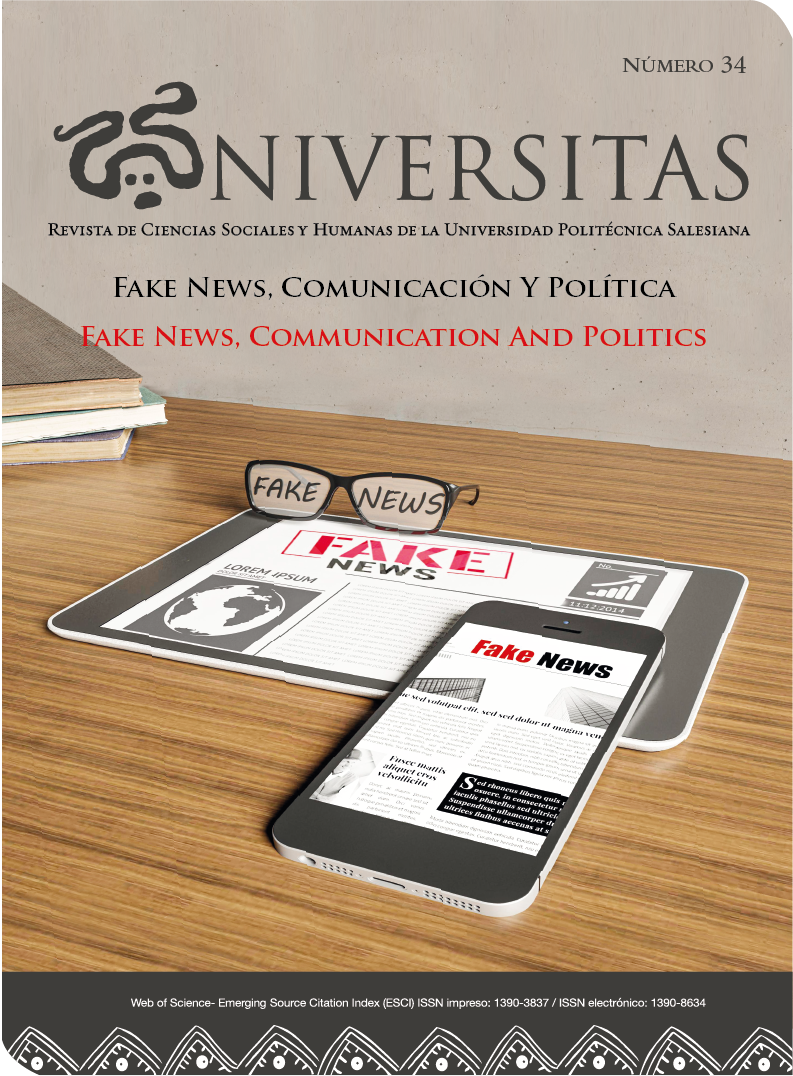Artificial Intelligence, algorithms and freedom of expression
Main Article Content
Abstract
At present this is under debate within the international arena given that, since Artificial Intelligence lacks the ability to contextualize what it moderates, it is presented more as a tool for indiscriminate prior censorship, than as a moderation in order to protect the freedom of expression.
Therefore, after analyzing international legislation, reports from international organizations and the terms and conditions of Twitter and Facebook, we suggest five proposals aimed at improving algorithmic content moderation.
In the first place, we propose that the States reconcile their internal laws while respecting international standards of freedom of expression. We also urge that they develop public policies consistent with implementing legislation that protects the working conditions of human supervisors on automated content removal decisions.
For its part, we understand that social networks must present clear and consistent terms and conditions, adopt internal policies of transparency and accountability about how AI operates in the dissemination and removal of online content and, finally, they must carry out prior evaluations impact of your AI on human rights.
Article Details
Universitas-XXI Journal aligns with the principles of open access and academic collaboration by adopting the Creative Commons Attribution-NonCommercial-ShareAlike 4.0 International License (CC BY-NC-SA 4.0). This license ensures that published content can be used and shared widely under the following conditions:
Attribution: Authors and the journal must be appropriately credited as the original creators of the content, with full reference and a link to the publication provided.
Non-commercial use: Content may not be used for commercial purposes, preserving its academic and educational intent.
ShareAlike: Derivative works must be distributed under the same terms as this license, promoting the creation of accessible and equitable knowledge.
By implementing this license, the Universitas-XXI Journal strengthens its commitment to disseminating high-quality research, providing free access to knowledge, and fostering a collaborative environment among researchers, educators, and students worldwide.
This decision reflects core values of responsibility, ethics, and transparency in academia, ensuring that intellectual contributions serve as a foundation for new research and projects while respecting the rights of authors and the scientific community.
For more information about this license, please visit the following link: https://creativecommons.org/licenses/by-nc-sa/4.0/"
References
Corte Interamericana de Derechos Humanos (2009). Caso Tristán Donoso vs Panamá. Serie C No. 193.
_____ (2011).Caso FontevecchiayD’amico Vs. Argentina. Serie C No. 238.
Corte Suprema de Justicia de la Nación Argentina (2013). Grupo Clarín S.A. y otros c/ Poder Ejecutivo Nacional y otros/ Acción meramente declarativa. Ver voto de la mayoría. Octubre 29.
Cox, J. (2020). TwitterSaysItBlocked NY Post Hunter BidenArticleBecauseItContainsHacked Data.https://bit.ly/2MNSDxB
Daus, G. (2019). Entrevista: Walter Sosa Escudero y la big data: el experto ante el diluvio de datos. Clarín.https://bit.ly/39AzxnC
Del Campo, A. (2020). ¿La desinformación en democracia o la democracia de la desinformación?Univ. de Palermo. Facultad de Derecho. Centro de Estudios en Libertad de Expresión y Acceso a Información. Septiembre.
EuropeanCommission (2019). Ethicsguidelinesfortrustworthy AI. https://bit.ly/3alzqM1
Facebook (2020). Normas Comunitarias. Punto 21. https://bit.ly/3cwmyFm
Facebook Transparency (2019). Content RestrictionsBased on Local Law. https://bit.ly/3ameWCW
Lions, T. (2018). HardQuestions: What’sFacebook’sStrategyforStopping False News?https://bit.ly/3j6VGwZ
Marantz, A. (2020). Why Facebook Can’tFixItself. The New Yorker.https://bit.ly/3r5oMQa
New America (2020). So WhatShould Companies Do? New Americahttps://bit.ly/3je4DET
Organización de las Naciones Unidas, ONU (1966). Pacto Internacional de Derechos Civiles y Políticos. Diciembre 16.
_____ (2011). Comentario General n 34 del Comité de Derechos Humanos. Párrafo 9. Septiembre 12.
_____ (2018). Informe del Relator Especial sobre la promoción y protección del derecho a la libertad de opinión y de expresión. Abril 6.
_____ (2018). Promoción y protección del derecho a la libertad de opinión y expresión. Agosto 29.
Secretaría General de la Organización de los Estados Americanos (2017). Libertad de expresión: a 30 años de la Opinión Consultiva sobre la colegiación obligatoria de periodistas: Estudios sobre el derecho a la libertad de expresión en la doctrina del Sistema Interamericano de Derechos Humanos. Bogotá.Colombia. Noviembre.
Twitter (2020). Política relativa a los contenidos multimedia falsos y alterados. https://bit.ly/3raXE2f
_____ (2020). Acerca de las excepciones de interés público en Twitter. https://bit.ly/36zKXGy

